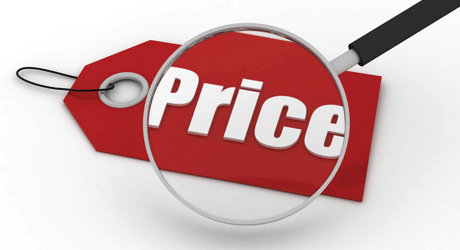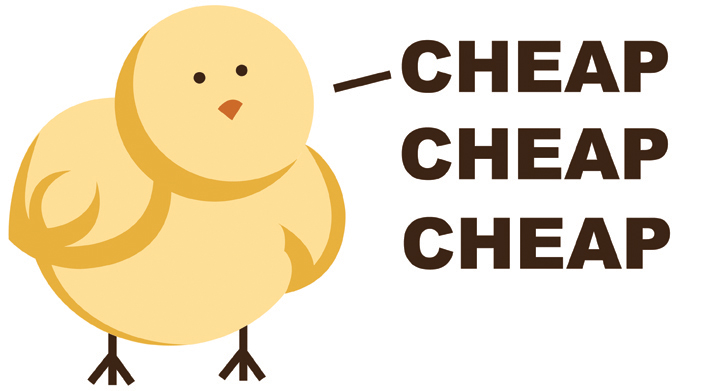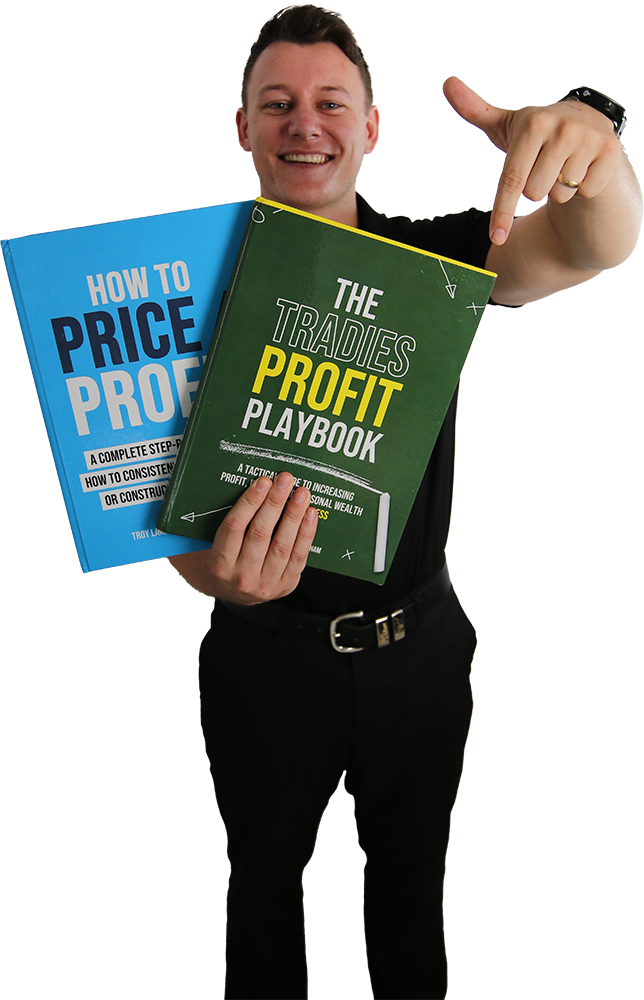Right now, I’m seeing trade and construction business owners across just about every single industry, market, and niche asking the same question, again, and again, and again…. "What’s the going rate?".
But I’m telling you right now this is one of the fastest ways to ruin your business and send yourself to the financial poor house.
Which is why I’m going to share the 5 main reasons why I believe you should STOP charging the going rate.
Reason One: YOUR numbers are YOUR numbers

The first reason why you need to stop charging the going rate… and this is a big one… is because YOUR numbers are YOUR numbers!
Think about your own personal income goals, think about the overheads that you have in your business, your own debt situation, how efficient you are, how long it takes your team to do something…
Now how could you possibly know what this all looks like in the other businesses around you?
YOU CAN'T!
So, why would you want to be charging what they’re charging?
All of these things are specific to you, these are YOUR numbers.
And so, the only rate that matters is the rate that’s going to allow you to deliver a great experience for your customers, cover all your costs of doing business, and make the personal income that YOU specifically want to make.
So, do yourself a favour and stop asking what the going rate is because the only numbers that matter, the only price that matters, is the price that’s going to allow you to hit your goals.
You might have an overhead that’s double the size of someone else’s, your team might take twice as long to deliver your work, you might have more debt than someone else, your situation could be completely different to everyone around you (And chances are that it is!).
So, that’s why the going rate just doesn’t matter.
What matters is your own numbers, your own goals, and your own maths.
I cannot stress this enough.
I see so many business owners struggling financially because they just haven’t taken the time to sit down and figure out what their own numbers need to be...
This elusive going rate everyone seems to chase has most likely been created by someone with completely different circumstances to you, and copying this rate, 9 times out of 10, will be the fastest way to send yourself to the financial poor house.
Reason Two: It's keeping you price focused

Price will always be a factor in someone’s decision to hire you or not, but it’s only ONE factor…
What most customers really want is value for money!
People rarely buy something purely because it’s the lowest priced option.
It’s why you don’t buy the lowest priced car on the market.
Why you don’t buy all your clothes from the second-hand shop.
Why you don’t you get the cheapest phone or the cheapest tools…
Because you want value for money!
And your ideal customers are the same.
Most don’t want the cheap, ‘lowest priced’ option.
Most just want value for money.
There’s a BIG difference between the two.
Cheapest is lowest in price whereas value for money is getting something cheaper than what it’s perceived to be worth.
It’s critical you understand this.
Value is believing what you’re getting is worth more than what you’re paying for it.
The moment you feel the value you’re going to get dips below the price you’re going to pay, you no longer feel like you’re getting a bargain and chances are, you won’t buy.
So, instead of fixating on pricing and in turn allowing your customers to fixate on price…
Put your time and attention into the work you should be doing on marketing, sales, and customer experience to make sure that what you’re providing in your service is actually more valuable.
This effort will help you price better than the cheapest rates people in your area are willing to charge i.e. the 'going rate'.
Reason Three: Cheap prices attract cheap customers

The way you price your services says a lot about the type of business you run, the quality of work people ASSSUME you deliver, and the type of clients you’re typically going to deal with.
Cheap prices attract cheap customers…
If you’re fixating on the going rate and undercharging your services just to try and win more work, have a think about the type of people you’ll be dealing with… budget buyers and tyre kickers that will still try and heckle you down even further until your border line free…
And guess what?
Thieves hang with thieves!
Complaining, discount wanting, price driven, never satisfied type customers are likely going to refer people with the same expectations.
So, if your prices are too low, you are sending the wrong message.
And if you aren’t making enough money, and you’re not investing in your brand, your image, your logo, website, social media, great uniforms, vehicle wraps and spending money to make sure that everything is professional…
Then the ‘high end’ people that everyone likes to say they want to work for won’t give you the time of day because the message that you’re sending them is that you’re not on their level.
I’ve actually seen people lose jobs in the past, literally because they were too cheap.
Because if the prices is too cheap, the people that live in all these great areas that you want to work with will automatically think…
"Something must be wrong, something must be missing, they must be taking a short cut"
Because premium clients are looking for a premium provider, and great clients, typically, associate price with value.
The higher the price, the higher the value.
Likewise, the lower the price, the lower the value.
So, your cheap prices are giving you cheap positioning…
They’re looking for a greater experience and more value for what they’re paying so if you’re charging at the going rate, you’re only hurting yourself.
Your pricing needs to attract the type of customers that you want to attract, and your pricing needs to reflect the type of brand that you’re building.
Stop trying to be high end and affordable… it just doesn’t work.
The words luxury and affordable don’t belong in the same sentence.
You say you want to be high-end, work with the best customers, and be known as the premium brand but you’re fixating on what everyone else is charging...
Instead, be high value, speak the right message, make the right impression so that the right clients trust that you are the right company to work with… that’s the key.
There are so many potential clients out there that are wanting to pay top dollar for a great experience and for a premium contractor that they can trust - so allow yourself to be that company in your area.
If you deliver an exceptional experience, and you really look after the people you serve, then price accordingly.
Reason Four: You'll work a lot more for a lot less
When you’re undercharging your services it still costs you the same amount to deliver your work.
Meaning you’re going to be working a lot harder for a lot less…
Sure, you can get some work, you can even get busy… but does busy mean profitable?
If you’re filling your books as a result of ‘competitive pricing’, all you’re going to be is busy and broke.
And I’ll give you an example of how much of a difference this makes…
Let’s say you your average job is worth $5,000, your average job costs are $4,000, and you do 100 jobs a year, so you turn half a million dollars and make $100,000 in gross profit.
Now let’s keep everything the same, but instead of $5,000 per job, you actually charge $6,000…
What that would do is actually allow you to do 60 jobs a year instead of 100, and actually earn $120,000 in gross profit instead of 100,000.
So, you could work 40% less, and still earn 20% more…!
Just by increasing your prices by an extra grand…
Another example is let’s say your average project is $50,000, your costs are $40,000, you do 100 jobs a year and so you turn $5M with a gross profit of $1M… now let’s say you increase your average project price by just 5%...
So, instead of charging $50,000, you charge $52,500…
You could drop 20% of your work, miss out on $800,000 worth of revenue and still earn the exact same amount of gross profit…
So, pricing based off what other people are pricing is going to leave you working a lot more for a lot less and chances are you’ll be leaving thousands and thousands of dollars on the table that should be sitting in your bank account.
So, don’t be busy and broke…
Which brings me to the final, and probably the most important reason why you DO NOT want to give a shit about what the so-called going rate is and why you should stop charging it…
Reason Five: Most business owners are WRONG

The large majority of trade businesses are wrong.
They don’t know their own numbers…
And I’m telling you this from years of working with trade and construction businesses as both an accountant and as a business coach.
Most people don’t have any idea about the numbers in their business or how they should be pricing or what profit margins are actually even possible on the jobs that they’re doing…
And yet, everyone keeps asking ‘hey what are you charging for this?’, ‘what’s the going rate for this?’… and I’m constantly seeing this asked on our social media accounts and in all the different Facebook groups out there…
But I want you to think about this for a minute, the average trade business owner might be turning around half a million, 1 million dollars… and in my experience and from what I’m seeing all the time… they’re probably either not turning a profit, barely breaking even, or they’re only making around 40-60,000 a year profit…
This is what I'm seeing…
So, why would we ask people like that, that are barely getting by themselves, what the hell they’re charging… right?
It just doesn’t make sense.
If you want to turn your business around, if you want to make more money and have the freedom that you say you want to have, and really build a business that’s profitable and actually going to be around for a long time and that doesn’t keep you constantly stressing about money…
Then the last thing that you need to be doing is asking other trade business owners who are struggling… what the going rate is.
A lot of people price their work at a point that it’s just enough to keep the lights on.
“Just enough” for them to become a slave to their own business…
The business makes “just enough” to justify the owner waiting anxiously for things to “turn around,” and by the time that lie is realised, they’re already in too deep to pivot.
And then each year, the bottom 10-20 percent of operators get forced out or lose the will to continue and close up shop.
Then fresh contractors, new ‘young guns’, enter the market with no idea about pricing, copy the ‘going rates’ and repeat the process of their forefathers and around and around they go.
So, stop focusing on what old mate down the road is charging… Stop focusing on what your old boss used to charge… Stop focusing on what Scott from your local Facebook group charges…
And start focusing on your OWN numbers!
The ‘going rate’ is really just a formal title for the minimum amount per hour a contractor is prepared to work for in any given area.
And this ‘going rate’ figure has been produced by thousands of contractors over the years following the same process…
1. Look at the marketplace
2. Figure out what everyone else is charging
3. Go slightly below it to remain “competitive”
4. End up with a value proposition of “same for less”
So, as more competitors enter the market offering “a little more for a little less”, eventually no one can provide any more for any less.
So, how is anyone supposed to make any money doing this?
I remember helping a client who at the time had just started out in business and have pretty much followed this exact process. And when I started working the numbers looking to calculate his rates and help him price for profit… I asked him,
“What’s the rate that you’re currently charging yourself out at?”.
And his response was, “Too be honest, I’m embarrassed to even tell you, I know it’s too low, but I just don’t know what I’m doing…”
His hourly rate was $65, and he was unprofitable.
And here’s the kicker… this guy was exceptional at his trade and he always overdelivered and looked after his clients…
So, over overnight we talked him into raising his rates to $99 per hour which was an increase of $34 per hour.
Which immediately put him on track to earn $100,000 for himself, grow his team and purchase a new work vehicle… all within 10 short weeks without any bite back from clients.
And here’s the thing… his hourly rate is now north of $120… which still shouldn’t mean anything to you because that’s based off HIS OWN NUMBERS!
But that’s the power of letting go of the so called ‘going rate’ and breaking out of the belief that you have to be charging exactly what everyone else is.
I believe every trade business owner should at least be earning $100,000 for all of the hard work and effort that put into their business and the risk that they take on and put themselves through…
So, if you want to get out of the rat race of low pricing, you need to stop focusing on what everyone else is charging and start focusing on what YOU need to charge.
As a modern-day trade business owner it’s your responsibility and your obligation to learn how to price correctly and learn how to price for profit.
And so that’s the 5 main reasons why I believe you should stop charging the going rate.
Now, if you’re struggling with understanding your numbers, or how to price or sell at higher margins, get more clients or really just make more money in your business…
Then I want to encourage you to get in touch with myself and my team.
We work with business owners across every trade to help them wrap their heads around their numbers and scale their profits as fast as possible… so if that’s you, head to Trade Business Accountants and book in a call today.
If you're an electrician, plumber, painter, carpenter, or any other tradie business owner turning more than $1M a year looking for assistance with your tax, accounting, bookkeeping, and business advisory - click here to learn more!

